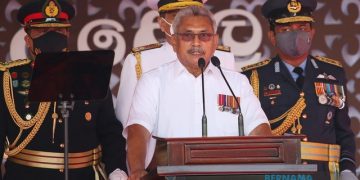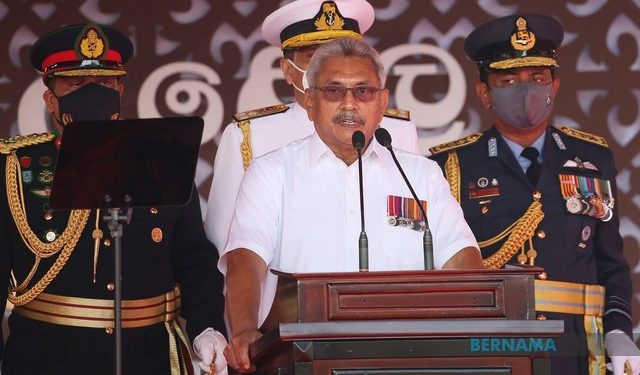COLOMBO, Sri Lanka — Sri Lankan President Gotabaya Rajapaksa resigned Thursday from his sudden exile in Singapore, a day after fleeing the country he led for nearly three years.
Forced out by a civilian uprising over the island nation’s economic collapse, the 73-year-old Rajapaksa had left Sri Lanka before dawn Wednesday to escape public fury over an economy in free fall.
He kept his country on tenterhooks even as he was on the run, first flying to Maldives and then missing his self-declared deadline for stepping down.
The delay helped him escape while he still enjoyed presidential immunity, but his maneuver sparked fresh protests in which one person died. His ouster now sets off a full leadership struggle.
“The speaker has received a letter of resignation from President Gotabaya Rajapaksa via the Sri Lankan High Commission in Singapore,” a statement from Parliament speaker Mahinda Yapa Abeywardena’s office said late Thursday local time.
The statement, issued hours after Rajapaksa landed in Singapore, said a formal announcement will be made Friday after the letter is authenticated.
His exit brings a sordid end to the storied Rajapaksa dynasty that has dominated Sri Lankan politics for decades.
Many hold the Rajapaksa family, which until recently also held the positions of prime minister and finance minister, responsible for the economic mismanagement that has brought the country to economic collapse.
The crisis has left Sri Lanka unable to repay its foreign debt and with little money to import much-needed fuel and food. Fuel is in dangerously short supply and prices for essential items like rice have doubled from a year ago.
A spokesperson for Singapore’s foreign ministry said in a statement that Rajapaksa had been allowed into the country on a private visit.
“He has not asked for asylum and neither has he been granted any asylum. Singapore generally does not grant requests for asylum,” the statement said. It is unclear if Rajapaksa will stay in Singapore for an extended period, or move to another country soon.
In Sri Lanka, authorities reimposed a curfew in Colombo as an uneasy calm prevailed on the capital’s streets. Demonstrators withdrew on Thursday from three major government buildings they had occupied, following Wednesday’s violent clashes with security forces that left one protester dead.
Rajapaksa’s flight from the country on Wednesday threatened to pull the island nation deeper into a political abyss and risked further delay to a bailout package from the International Monetary Fund.
The military barricaded the road leading to Parliament, one of the few political landmarks that protesters had not seized. Dozens were injured in Wednesday’s clashes, including a police officer and a soldier. One protester died after being tear-gassed.
The appointment of Prime Minister Ranil Wickremesinghe as acting president had further incensed demonstrators, who stormed his office after a confrontation with security forces.
Later, protesters and security clashed near Parliament, and opposition leaders called on Wickremesinghe to resign as prime minister.
The protesters’ decision to withdraw from three buildings, including the residences of the president and the prime minister, was a surprise. They said they would keep occupying the presidential office, as a symbol of what they call a people’s movement.
At the colonial-era presidential residence, police locked the main building’s large white doors as people scrambled for a final selfie. Protesters in black T-shirts packed up a sound system and picked trash from the gardens.
By Washington Post











